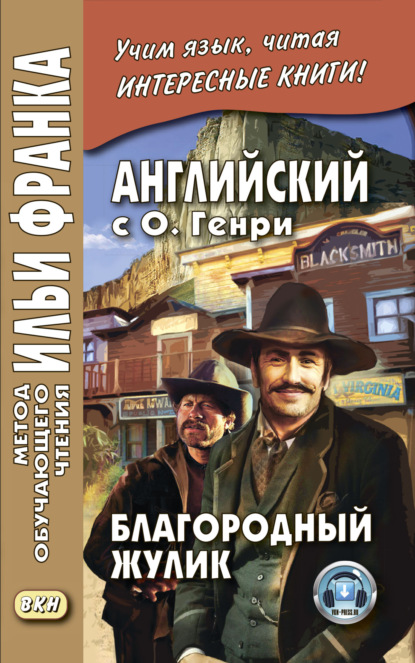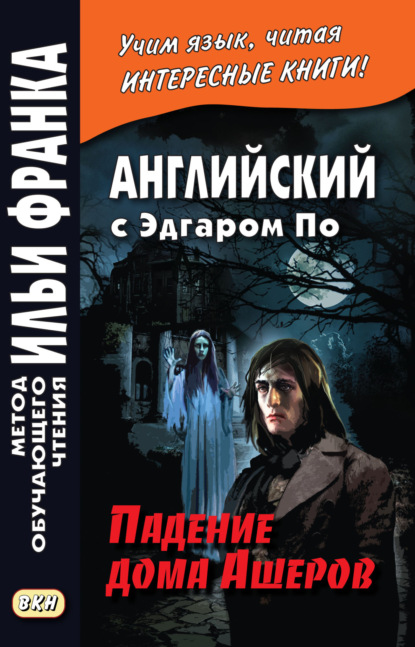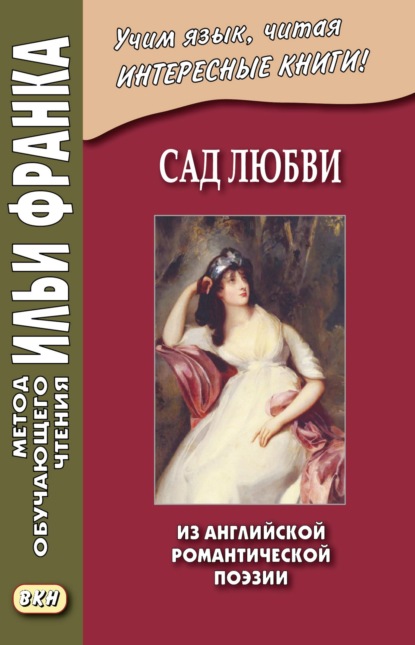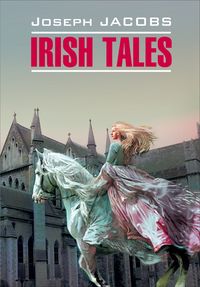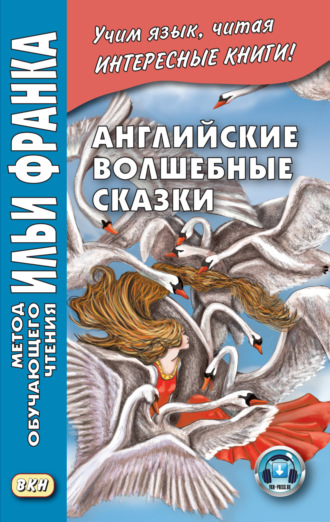
Полная версия
Английские волшебные сказки / English Fairy Tales
So that was another big silly (так /что/ этот был другим = еще одним большим дураком).
handkerchief [‘hæŋkətʃi:f], awkward [‘ɔ:kwəd], obliged [ə’blaɪʤd]At last he stopped and wiped his face with his handkerchief. ‘Oh dear,’ he says, ‘I do think trousers are the most awkwardest kind of clothes that ever were. I can’t think who could have invented such things. It takes me the best part of an hour to get into mine every morning, and I get so hot! How do you manage yours?’ So the gentleman burst out a-laughing, and showed him how to put them on; and he was very much obliged to him, and said he never should have thought of doing it that way.
So that was another big silly.
Then the gentleman went on his travels again (затем джентльмен пошел путешествовать: «отправился в свои путешествия» снова); and he came to a village (и пришел в деревню), and outside the village there was a pond (и снаружи = возле деревни был пруд), and round the pond was a crowd of people (а вокруг пруда была толпа людей). And they had got rakes (и у них были кочерги; to have got – иметь: «иметь полученным»; to get – получать), and brooms (и метлы), and pitchforks (и вилы) reaching into the pond (тянущиеся в пруд = и они совали все это в пруд); and the gentleman asked what the matter was (и джентльмен спросил, в чем было дело).
‘Why (как же),’ they say, ‘matter enough (большое событие: «дела достаточно» – архаич. разг.)! Moon’s tumbled into the pond (луна свалилась в пруд), and we can’t rake her out anyhow (и мы никак не можем вытащить ее)!’ So the gentleman burst out a-laughing (тогда джентльмен разразился смехом), and told them to look up into the sky (и сказал им посмотреть вверх в небо), and that it was only the shadow in the water (и что это было лишь отражение на воде: «тень в воде»). But they wouldn’t listen to him (но они не хотели слушать его), and abused him shamefully (и оскорбляли его стыдно = нехорошими словами; shame – стыд, позор), and he got away (и он убрался) as quick as he could (так быстро, как /только/ мог).
crowd [kraʋd], shadow [‘ʃædəʋ], abuse [ə’bju:z]Then the gentleman went on his travels again; and he came to a village, and outside the village there was a pond, and round the pond was a crowd of people. And they had got rakes, and brooms, and pitchforks reaching into the pond; and the gentleman asked what the matter was.
‘Why,’ they say, ‘matter enough! Moon’s tumbled into the pond, and we can’t rake her out anyhow!’ So the gentleman burst out a-laughing, and told them to look up into the sky, and that it was only the shadow in the water. But they wouldn’t listen to him, and abused him shamefully, and he got away as quick as he could.
So there was a whole lot of sillies bigger than them three sillies at home (так что было много: «целая куча» дураков бóльших, чем те три дурака дома; them «их» – разг. простореч. вместо опред. артикля the). So the gentleman turned back home (так что джентльмен повернул назад домой) and married the farmer’s daughter (и женился на дочери крестьянина), and if they didn’t live happy for ever after (и если они не жили счастливо всю жизнь: «навсегда после»), that’s nothing to do with you or me (это не касается ни вас, ни меня: «это имеет ничего, чтобы делать с вами или мной»).
turned [tɜ:nd]So there was a whole lot of sillies bigger than them three sillies at home. So the gentleman turned back home and married the farmer’s daughter, and if they didn’t live happy for ever after, that’s nothing to do with you or me.
How Jack Went to Seek His Fortune
(Как Джек ходил искать свое счастье)Once on a time (однажды) there was (жил да был: «там был») a boy named Jack (мальчик по имени: «названный» Джек), and one morning (и одним утром) he started to go (он пустился в путь: «отправился идти») and seek his fortune (и искать свое счастье).
He hadn’t gone very far (он не ушел очень далеко = не успел еще далеко отойти) before he met a cat (прежде чем = как встретил кота; to meet).
‘Where are you going, Jack (куда ты идешь, Джек)?’ said the cat (сказал кот).
‘I am going to seek my fortune (я иду искать мое счастье).’
‘May I go with you (могу я пойти с тобой = можно, я пойду с тобой)?’
‘Yes,’ said Jack (да, – сказал Джек), ‘the more the merrier (чем больше /народу/, тем веселее; merry – веселый).’
So on they went (так дальше они пошли = и они пошли дальше), jiggelty-jolt, jiggelty-jolt (топ-топ).
fortune [‘fɔ:tʃən]Once on a time there was a boy named Jack, and one morning he started to go and seek his fortune.
He hadn’t gone very far before he met a cat.
‘Where are you going, Jack?’ said the cat.
‘I am going to seek my fortune.’
‘May I go with you?’
‘Yes,’ said Jack, ‘the more the merrier.’
So on they went, jiggelty-jolt, jiggelty-jolt.
They went a little further and they met a dog (они прошли немного дальше и встретили пса; further – дальше; far – далеко).
‘Where are you going, Jack (куда ты идешь, Джек)?’ said the dog.
‘I am going to seek my fortune (я иду искать мое счастье).’
‘May I go with you (могу я пойти с тобой)?’
‘Yes,’ said Jack, ‘the more the merrier (чем больше, тем веселее).’
So on they went (и они пошли дальше), jiggelty-jolt, jiggelty-jolt.
They went a little further and they met a goat (они прошли немного дальше и встретили козла).
‘Where are you going, Jack (куда ты идешь, Джек)?’ said the goat.
‘I am going to seek my fortune (я иду искать мое счастье).’
‘May I go with you (могу я пойти с тобой)?’
‘Yes,’ said Jack, ‘the more the merrier (чем больше, тем веселее).’
So on they went, jiggelty-jolt, jiggelty-jolt.
further [‘fɜ:ðə], goat [ɡəʋt]They went a little further and they met a dog.
‘Where are you going, Jack?’ said the dog.
‘I am going to seek my fortune.’
‘May I go with you?’
‘Yes,’ said Jack, ‘the more the merrier.’
So on they went, jiggelty-jolt, jiggelty-jolt.
They went a little further and they met a goat.
‘Where are you going, Jack?’ said the goat.
‘I am going to seek my fortune.’
‘May I go with you?’
‘Yes,’ said Jack, ‘the more the merrier.’
So on they went, jiggelty-jolt, jiggelty-jolt.
They went a little further and they met a bull (и встретили быка).
‘Where are you going, Jack?’
‘I am going to seek my fortune.’
‘May I go with you?’
‘Yes,’ said Jack, ‘the more the merrier.’
So on they went, jiggelty-jolt, jiggelty-jolt.
They went a little further and they met a rooster (петуха).
‘Where are you going, Jack?’ said the rooster.
‘I am going to seek my fortune.’
‘May I go with you?’
‘Yes,’ said Jack, ‘the more the merrier.’
So on they went, jiggelty-jolt, jiggelty-jolt.
bull [bʋl], rooster [‘ru:stə]They went a little further and they met a bull.
‘Where are you going, Jack?’
‘I am going to seek my fortune.’
‘May I go with you?’
‘Yes,’ said Jack, ‘the more the merrier.’
So on they went, jiggelty-jolt, jiggelty-jolt.
They went a little further and they met a rooster.
‘Where are you going, Jack?’ said the rooster.
‘I am going to seek my fortune.’
‘May I go with you?’
‘Yes,’ said Jack, ‘the more the merrier.’
So on they went, jiggelty-jolt, jiggelty-jolt.
Well, they went on (ну, они шли дальше) till it was about dark (пока не стало темнеть: «пока это было около тьмы» – архаич., разг.), and they began to think of some place (и начали думать о каком-нибудь месте) where they could spend the night (где они могли бы провести ночь). About this time (около этого времени) they came in sight of a house (они увидели дом; sight – поле зрения, видимость), and Jack told them to keep still (и Джек сказал им сохранять тишину: «сохраняться/держаться тихими») while he went up (в то время как он подошел) and looked in through the window (и заглянул внутрь сквозь окно). And there were some robbers (и там было несколько разбойников) counting over their money (пересчитывавших свои деньги). Then Jack went back (тогда Джек пошел назад) and told them to wait (и сказал им пождать) till he gave the word (пока он не скажет: «не даст» слово), and then to make all the noise they could (и потом сделать столько шуму, сколько смогут: «делать весь шум /который/ они могли»). So when they were all ready (и когда они были все готовы) Jack gave the word (Джек сказал слово = дал команду), and the cat mewed (и кот мяукнул; to mew), and the dog barked (и пес залаял), and the goat bleated (и козел заблеял), and the bull bellowed (и бык заревел), and the rooster crowed (и петух закукарекал), and altogether (и все вместе/в целом) they made such a dreadful noise (они наделали такой ужасный шум) that it frightened the robbers all away (что он испугал и прогнал разбойников: «спугнул разбойников совсем прочь»).
sight [saɪt], mew [mju:], altogether [,ɔ:ltǝ’ɡeðǝ]Well, they went on till it was about dark, and they began to think of some place where they could spend the night. About this time they came in sight of a house, and Jack told them to keep still while he went up and looked in through the window. And there were some robbers counting over their money. Then Jack went back and told them to wait till he gave the word, and then to make all the noise they could. So when they were all ready Jack gave the word, and the cat mewed, and the dog barked, and the goat bleated, and the bull bellowed, and the rooster crowed, and altogether they made such a dreadful noise that it frightened the robbers all away.
And then they went in (и тогда они вошли внутрь) and took possession of the house (и захватили дом: «взяли обладание домом»). Jack was afraid (Джек опасался: «был испуган») the robbers would come back in the night (что разбойники придут назад ночью), and so when it came time (и вот, когда пришло время) to go to bed (идти в кровать) he put the cat in the rocking-chair (он усадил: «поместил» кота в кресло-качалку; rocking-chair – кресло-качалка: «качающийся стул»), and he put the dog under the table (и посадил пса под стол), and he put the goat upstairs (и поставил козла на втором этаже: «вверху лестницы»; upstairs – вверх /по лестнице/, наверх; наверху, в верхнем этаже; верхняя часть здания, верхний этаж), and he put the bull in the cellar (и поставил быка в подвал), and the rooster flew up on to the roof (а петух взлетел на крышу), and Jack went to bed (а Джек пошел в кровать).
possession [pǝ’zeʃ(ǝ)n], afraid [ǝ’freɪd]And then they went in and took possession of the house. Jack was afraid the robbers would come back in the night, and so when it came time to go to bed he put the cat in the rocking-chair, and he put the dog under the table, and he put the goat upstairs, and he put the bull in the cellar, and the rooster flew up on to the roof, and Jack went to bed.
By and by (тем временем; by and by – вскоре) the robbers saw (разбойники увидели) it was all dark (что совсем стемнело: «было совсем темно») and they sent one man back to the house (и они послали одного человека назад к дому; to send) to look after their money (посмотреть за их деньгами = попробовать раздобыть их деньги). Before long (скоро: «раньше долгого») he came back (он пришел назад) in a great fright (в большом ужасе) and told them his story (и рассказал им свою историю; to tell).
‘I went back to the house (я пошел назад к дому),’ said he, ‘and went in (и вошел внутрь) and tried to sit down in the rocking-chair (и попытался сесть в кресло-качалку), and there was an old woman knitting (а там была старая женщина, вяжущая = которая вязала; to knit – вязать), and she stuck her knitting-needles into me (и она вонзила свои вязальные спицы в меня; to stick – вонзить).’ That was the cat (это был кот), you know (/как/ вы знаете).
‘I went to the table to look after the money (я пошел к столу, чтобы поискать деньги), and there was a shoemaker under the table (а под столом был сапожник), and he stuck his awl into me (и он вонзил свое шило в меня).’ That was the dog, you know (это был пес, /как/ вы знаете).
awl [ɔ:l], axe [æks], shoemaker [‘ʃu:,meɪkə]By and by the robbers saw it was all dark and they sent one man back to the house to look after their money. Before long he came back in a great fright and told them his story.
‘I went back to the house,’ said he, ‘and went in and tried to sit down in the rocking-chair, and there was an old woman knitting, and she stuck her knitting-needles into me.’ That was the cat, you know.
‘I went to the table to look after the money, and there was a shoemaker under the table, and he stuck his awl into me.’ That was the dog, you know.
‘I started to go upstairs (я начал идти = пошел вверх по лестнице), and there was a man up there threshing (а там наверху был человек, молотящий), and he knocked me down with his flail (и он сбил меня вниз своим цепом).’ That was the goat, you know (это был козел, /как/ вы знаете).
‘I started to go down into the cellar (я пошел вниз в погреб), and there was a man down there chopping wood (а там внизу был человек, колющий дрова), and he knocked me up (и он подбросил: «ударил» меня вверх) with his axe (своим топором).’ That was the bull, you know (это был бык, /как/ вы знаете).
‘But I shouldn’t have minded all that (но я не стал бы обращать внимание на все это) if it hadn’t been for that little fellow on top of the house (если бы не тот маленький парень на верху дома), who kept a-hollering (который все время вопил; to keep – держать, не отдавать; продолжать делать /что-либо/), “Chuck him up to me-e (подбросьте его наверх ко мне; to chuck – бросить; кинуть; швырнуть)! Chuck him up to me-e!” Of course, that was the cock-a-doodle-do (конечно, это было кукареканье).
hollering [‘hɒlerɪŋ], cock-a-doodle-do [‘kɒkədu:dl’du:]‘I started to go upstairs, and there was a man up there threshing, and he knocked me down with his flail.’ That was the goat, you know.
‘I started to go down into the cellar, and there was a man down there chopping wood, and he knocked me up with his axe.’ That was the bull, you know.
‘But I shouldn’t have minded all that if it hadn’t been for that little fellow on top of the house, who kept a-hollering, “Chuck him up to me-e! Chuck him up to me-e!” Of course, that was the cock-a-doodle-do.
Nix Nought Nothing
(Ничего-Ничего-Ничего)There once lived a king and a queen (жили однажды король и королева) as many a one has been (каких много было). They were long married (они были долго женаты) and had no children (и не имели детей); but at last a baby boy (но наконец ребенок-мальчик) came to the queen (родился у королевы: «пришел к королеве») when the king was away in the far countries (когда король был в далеких странах; away – далеко; прочь). The queen would not christen the boy till the king came back (королева не хотела крестить ребенка, пока король не вернулся назад), and she said (и она сказала): ‘We will just call him Nix Nought Nothing until his father comes home (мы будем просто звать его Ничего-Ничего-Ничего, пока его отец не придет домой).’ But it was long before he came home (но прошло много времени: «это было долго», прежде чем он пришел домой), and the boy had grown a fine, bonny laddie (и мальчик вырос прекрасным крепким пареньком; bonny – здоровый, цветущий, пышущий здоровьем, крепкий). At length the king was on his way back (наконец король был на своем пути назад = на пути домой); but he had a big river to cross (но он должен был пересечь большую реку), and there was a whirlpool (а там был водоворот), and he could not get over the water (и он не мог переправиться через воду). But a giant came up to him (но великан подошел к нему), and said (и сказал): ‘I’ll carry you over (я перенесу тебя).’ But the king said: ‘What’s your pay (какова твоя цена: «плата»)?’
nought [nɔ:t], length [leŋθ], whirlpool [‘wɜ:lpu:l], giant [‘ʤaɪənt]There once lived a king and a queen as many a one has been. They were long married and had no children; but at last a baby boy came to the queen when the king was away in the far countries. The queen would not christen the boy till the king came back, and she said: ‘We will just call him Nix Nought Nothing until his father comes home.’ But it was long before he came home, and the boy had grown a fine, bonny laddie. At length the king was on his way back; but he had a big river to cross, and there was a whirlpool, and he could not get over the water. But a giant came up to him, and said: ‘I’ll carry you over.’ But the king said: ‘What’s your pay?’
‘Oh, give me Nix, Nought, Nothing (дай мне Ничего-Ничего-Ничего), and I will carry you over the water on my back (и я понесу тебя через воду на моей спине).’ The king had never heard that his son was called Nix Nought Nothing (король никогда/вовсе не слышал, что его сын был назван Ничего-Ничего-Ничего), and so he said (и потому он сказал): ‘Oh, I’ll give you that (я дам тебе это) and my thanks into the bargain (и мою благодарность в придачу: «в сделку»).’ When the king got home again (когда король снова добрался домой), he was very happy to see his wife again (он был очень счастлив увидеть снова свою жену), and his young son (и своего юного сына). She told him that she had not given the child any name (она сказала ему, что не дала ребенку никакого имени), but just Nix Nought Nothing (но просто /назвала/ Ничего-Ничего-Ничего), until he should come home again himself (пока он сам не вернется домой).
bargain [‘bɑ:ɡɪn], young [jʌŋ]‘Oh, give me Nix, Nought, Nothing, and I will carry you over the water on my back.’ The king had never heard that his son was called Nix Nought Nothing, and so he said: ‘Oh, I’ll give you that and my thanks into the bargain.’ When the king got home again, he was very happy to see his wife again, and his young son. She told him that she had not given the child any name, but just Nix Nought Nothing, until he should come home again himself.
The poor king was in a terrible case (бедный король был в ужасном положении). He said (он сказал): ‘What have I done (что я наделал)? I promised to give the giant (я обещал отдать великану) who carried me over the river on his back (который перенес меня через реку на своей спине) Nix Nought Nothing.’ The king and the queen were sad and sorry (король и королева были грустны и огорчены), but they said (но они сказали): ‘When the giant comes (когда великан придет) we will give him the hen-wife’s boy (мы дадим ему мальчика птичницы; hen – курица); he will never know the difference (он никогда не узнает разницы).’ The next day the giant came to claim the king’s promise (на следующий день великан пришел, чтобы потребовать обещанное королем: «обещание короля»), and he sent for the hen-wife’s boy (и он послал за мальчиком птичницы; to send); and the giant went away with the boy on his back (и великан ушел прочь с мальчиком на своей спине). He travelled till he came to a big stone (он шел: «путешествовал», пока он не пришел к большому камню), and there he sat down to rest (и там присел, чтобы отдохнуть). He said: ‘Hidge, Hodge, on my back (на моей спине), what time of day is that (какое время дня /сейчас/ = который сейчас час)?’
The poor little lad said (бедный маленький мальчик сказал): ‘It is the time that my mother (это время, когда моя мать), the hen-wife (птичница), takes up the eggs for the queen’s breakfast (доставляет яйца для завтрака королевы).’
promise [‘prɒmɪs], difference [‘dɪfrǝns], breakfast [‘brekfəst]The poor king was in a terrible case. He said: ‘What have I done? I promised to give the giant who carried me over the river on his back Nix Nought Nothing.’ The king and the queen were sad and sorry, but they said: ‘When the giant comes we will give him the hen-wife’s boy; he will never know the difference.’ The next day the giant came to claim the king’s promise, and he sent for the hen-wife’s boy; and the giant went away with the boy on his back. He travelled till he came to a big stone, and there he sat down to rest. He said: ‘Hidge, Hodge, on my back, what time of day is that?’
The poor little lad said: ‘It is the time that my mother, the hen-wife, takes up the eggs for the queen’s breakfast.’
Then the giant was very angry (тогда великан был очень сердит = рассердился), and dashed the boy on the stone (и швырнул мальчика о камень) and killed him (и убил его).
Back he went in a tower of a temper (и он вернулся: «пошел назад» в страшном гневе: «в груде/башне гнева»; tower – башня; высокая куча, груда; temper – характер, нрав; раздражительность, вспыльчивость) and this time (и на этот раз) they gave him the gardener’s boy (они дали ему мальчика садовника). He went off with him on his back (он ушел с ним прочь на своей спине) till they got to the stone again (пока они не добрались до камня снова) when the giant sat down to rest (когда = и великан сел, чтобы отдохнуть). And he said: ‘Hidge, Hodge, on my back, what time of day do you make that (как ты думаешь, который сейчас час)?’




